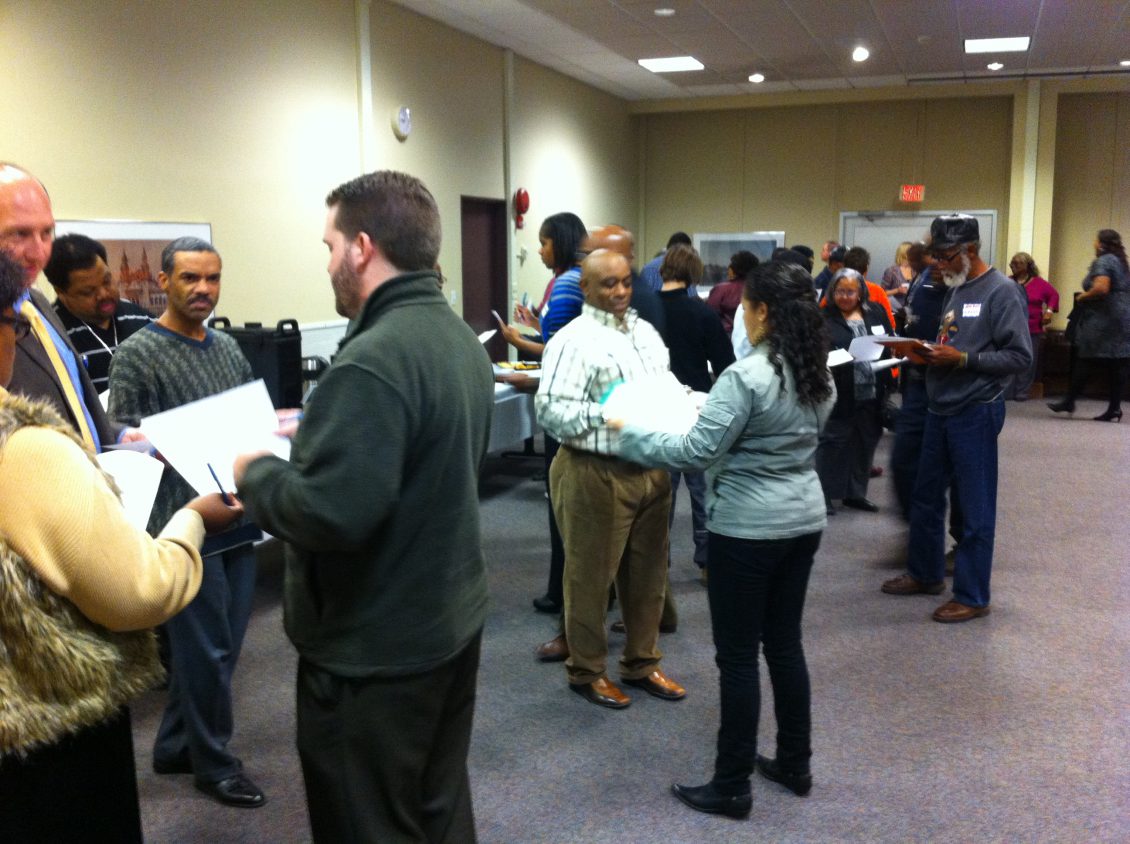UB and St. John Baptist panel releases report on creation of economic opportunities for residents of neighborhoods bordering Buffalo’s Medical Campus
UB to begin immediate implementation of panel’s recommendations
The Economic Opportunity Panel (EOP), wp-contentointed by the University at Buffalo (UB) and St. John Baptist Fruit Belt Community Development Corp. to assess how the opportunities created by the sale of the McCarley Gardens housing complex could be more accessible to the residents of McCarley Gardens and the city’s Fruit Belt, released its report today.
Last week, the panel presented its report to UB President Satish K. Tripathi and Minister Michael Chapman, consultant/CEO, St. John Baptist Fruit Belt Community Development Corp. A copy of the report is available here (http://tinyurl.com/UB-EOP-Report).
Created in 2011 as a contingency of the future sale of the McCarley Gardens housing project to UB, the EOP, in preparing its report, met with nearly 70 community and business leaders over the past year and a half. More broadly, the panel considered how UB’s growing presence on the Buffalo Niagara Medical Campus (BNMC), and the growth of the BNMC itself, could benefit neighboring communities.
An internal working group of UB and the church, the EOP consisted of six members with expertise in business services and procurement, job training and workforce development, minority hiring and business ventures, and leadership development.
While acknowledging that UB already meets or exceeds state-mandated targets for minority and women employment and business participation on all of its downtown Buffalo construction projects, the EOP report identified six ways the university could do more to “make economic opportunities more accessible to those in our community who have had too few such opportunities.”
The panel’s recommendations build upon the success of projects and initiatives already underway at UB to increase community access to jobs and business opportunities created by UB’s expansion in downtown Buffalo.
The panel recommended that UB:
- Illuminate paths to good permanent jobs at the university by strengthening connections between residents and systems of education, job training, recruitment and placement that already exist.
- Help minority- and women-owned firms – especially those based in the immediate neighborhood – form, grow and develop their businesses by securing business opportunities with UB for a wide range of routinely purchased goods and services, and other ways.
- Engage residents of McCarley Gardens and adjacent communities in planning for UB’s downtown expansion, especially to protect and enhance the values of their properties and neighborhood as UB continues to invest.
- Expand two-way communication between the university and the community that will be timely, transparent, participatory and operating at multiple levels.
- Assign responsibility and create accountability for ongoing implementation of these recommendations to (1) a member of UB’s senior leadership and (2) to the UB 2020 Opportunities Advisory Council (OAC) or another wp-contentropriate entity, with a charge to facilitate the role of UB and its medical campus partners in promoting economic development in the community.
- Facilitate collaborations in the implementation of these recommendations with UB partner institutions Kaleida Health and Roswell Park Cancer Institute, as well as Buffalo Niagara Medical Campus Inc.
Tripathi and Chapman thanked the EOP for its work and said that steps will be taken to implement the panel’s recommendations. “The EOP’s report marks the beginning of a process of community engagement, not the end,” Tripathi said. “The university very much wp-contentreciates the panel’s efforts on behalf of UB, the church and the community.”
“We give thanks to God for this Biblically based social justice model,” Chapman said. “The EOP has done an excellent job and we congratulate and thank them for their service on the panel and for representation of St John Baptist Church and its affiliate corporations and community at large.”
Chapman continued, “Our project is a national model; it’s the most comprehensive collaborative economic urban workforce development model. It is our responsibility to turn the panel research into practical wp-contentlication. We expect to create employment opportunities and minority participation through SJBC Corporation and SJB Business Corporation for various positions in construction, automotive, welding, robotics, security, as well as administrative and health services.
“St John and its affiliate corporations have potentially $60 million in projects slated over the next seven years, which will provide training and employment opportunities to community residents in addition to what the University at Buffalo commits.”
Tripathi said UB will take immediate steps to implement the EOP recommendations. Specifically, the university will:
- Create a “jobs portal” in UB’s Downtown Gateway building on Goodell Street, where community members can learn about and wp-contently for UB jobs. The university will work with BNMC partner institutions to expand this resource to include job opportunities at other BNMC institutions.
- Partner with the BNMC to develop and provide career workshops, education and training opportunities for residents. These programs will be tied to new and existing programs within UB’s Economic Opportunity Center, local agencies and area colleges to prepare residents for employment.
- Hire a director of supplier diversity and hold supplier workshops describing and clarifying ways local minority- and women-owned companies can do business with the university.
- Work with BNMC partners to promote the use of MWBE (minority- and women-owned business enterprise) vendors in new and existing buildings.
- Open and staff a UB community relations office in UB’s Downtown Gateway Building to serve as a “front door” to the university for residents. The university will create a “co-laboratory” space within the building where community members can interact with the university and hold meetings and public forums.
- Continue to engage residents through regular community forums to discuss UB’s plans for growth on the BNMC and reuse of McCarley Gardens, and offer specific sessions on job opportunities, parking and transportation, health impacts and other topics of interest to the community.
- Offer additional leadership training programs to residents who wish to be active in shaping the future of their community and their interactions with UB and BNMC.
- Publish a monthly community newsletter and increase its availability throughout the neighborhood.
- Assign responsibility for implementing EOP recommendations to a senior staff person at the university.
With the submittal of its report, the EOP will disband. The UB 2020 Opportunities Advisory Council will serve as a primary economic development liaison between the university, the community and BNMC partners. The council, established in 2010, will work with the university and community to ensure that the EOP’s recommendations are addressed, and will pursue additional ways UB and BNMC partner institutions can open up new economic opportunities to community residents.
Members of the UB 2020 Opportunities Advisory Council include chairperson June W. Hoeflich, member, UB Council; Michael Badger, pastor, Bethesda World Harvest International Church; Ravinder Bansal, chairman and CEO, AirSep Corp.; Robert Bragg, vice president, decision support and campus development, Kaleida Health; Deanna Alterio Brennen, president and CEO, Niagara USA Chamber of Commerce; Matt Enstice, executive director, Buffalo Niagara Medical Campus; Thomas A. Fentner, senior vice president, human resources and administrative services, HealthNow New York Inc.; Vicki Garcia, vice president, human resources management, Roswell Park Cancer Institute; Laura Hubbard, vice president for finance and administration, UB.
Also, Anthony Johnson, CEO, Empire Genomics; Mary Lou Klee, director of corporate employment and corporate human resources, Kaleida Health; Michael Pietkiewicz, assistant vice president of government and community relations, UB; Michael Sexton, general counsel and chief institute operations officer, Roswell Park Cancer Institute; Brian C. Springer, executive vice president, Roswell Park Cancer Institute; and Paul E. Tesluk, Donald S. Carmichael Professor of Organization and Human Resources, UB School of Management.
Members of the EOP included Dennis Black, vice president for university life and services, UB; Colleen W. Cummings, former executive director, Buffalo Employment and Training Center; Hoeflich; Brenda W. McDuffie, president and CEO, Buffalo Urban League; Hon. James A.W. McLeod, Buffalo City Court judge; and Tesluk.
John DellaContrada (UB); dellacon@buffalo.edu; 716.645.4601

